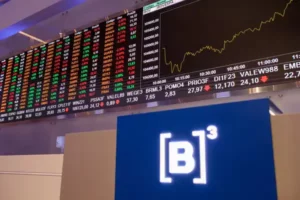On Monday, the Ibovespa closed almost unchanged, shedding a mere 0.03% to end at 128,465.69 points.
This minor adjustment underscores the caution prevailing among investors as they await the outcome of Brazil’s Central Bank meeting.
The Brazilian Real also weakened slightly, settling at R$ 5.07 against the dollar, reflecting broader concerns.
Globally, stock markets showed more vitality. In New York, indices closed higher, drawing strength from weaker-than-expected employment figures.
This mixed bag of economic indicators suggests a potentially tighter monetary policy from Brazil’s Central Bank in response to inflation fears sparked by rising commodity prices and a weaker currency.

This anticipation is mirrored in the latest market forecasts. Analysts now see the Selic rate inching up from 9.50% to 9.63% this year, with future projections holding steady or showing modest increases.
Maritime operations are also feeling the heat of geopolitical tensions.
Companies like Maersk are rerouting ships around Africa’s Cape of Good Hope to dodge threats in the Red Sea, a move that hikes freight costs and impacts global prices.
Brazil’s Economic Turmoil
In Europe, tensions surge with Russia’s new threats and an uneasy cease-fire in Gaza. Closer to home, Brazil grapples with its own crises.
The term “war situation” has been coined to describe the havoc wrought by environmental disasters in Rio Grande do Sul, demanding urgent governmental intervention.
The business impacts are tangible. For instance, the floods in Rio Grande do Sul are forecast to affect the meat industry significantly.
Goldman Sachs predicts notable EBITDA swings for BRF in the upcoming quarter, reflecting the state’s importance in Brazil’s agribusiness sector.
On the trading floor, BRF’s stock tumbled by 3.23% following a downgrade, influencing Marfrig’s 4.92% drop. Meanwhile, JBS saw a slight uptick.
In contrast, Braskem and Kora Saúde experienced sharp declines due to strategic shifts and market exits, highlighting the intricate dance of market forces and investor sentiments.

